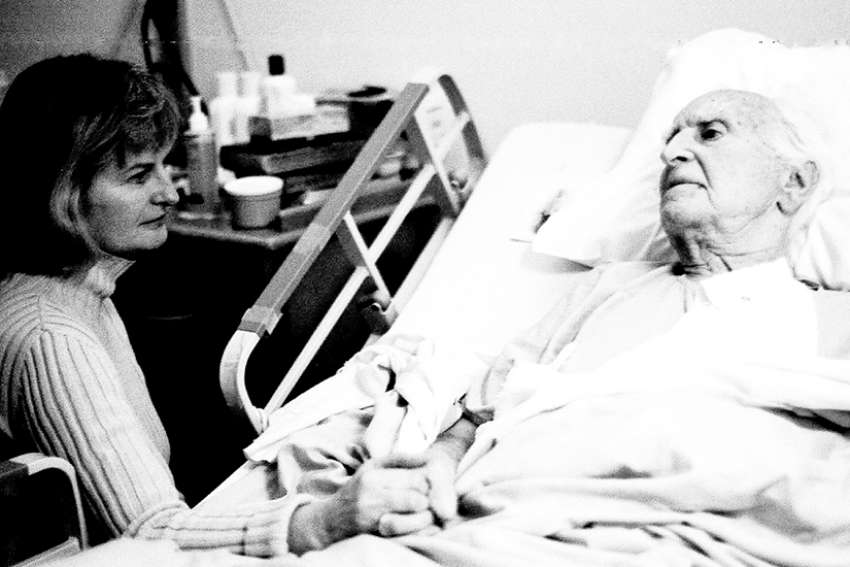A March 2016 report to the government by the Ontario Palliative Care Network informed provincial cabinet Ontario would need 814 hospice care beds by the end of the 2018-2019 fiscal year. The actual number of beds Ontario’s Ministry of Health expects to see operating at that point will be 528 — 286 short of its goal.
The report was obtained by The Catholic Register through a Freedom of Information request.
The 814 goal is itself short of international standards, said palliative care expert Dr. Jose Pereira.
“For every 100,000 people you need 10 beds, on average. Of those 10, two or three of them have to be acute palliative care unit beds,” said Pereira, the director of research with the College of Family Physicians of Canada
Given a provincial population of 13.5 million, Ontario currently needs 1,300 hospice and palliative care beds, of which about 900 should be lower maintenance hospice beds and the remaining 400 must be acute palliative care beds located in hospitals, said Pereira.
The province currently has 341 hospice beds spread across the province and should have 390 in place before the end of this year, said a spokesperson for the Ministry of Health and Long Term Care.
To measure how poorly Ontario is doing, Pereira compared Edmonton to Ottawa, two cities with fairly comparable populations. In the tale of two cities, Edmonton has 90 hospice beds and Ottawa 38, including 19 reserved for the homeless. Edmonton has 24 acute palliative care hospital beds. Ottawa has 31 palliative care beds in hospitals, but only about half of them are really capable of taking on the complex cases that can’t be cared for in a hospice, said Pereira.
“In Edmonton, you’ve got a palliative care team that helps family doctors in the community. That team has got five doctors and five nurses,” said Pereira. “In Ottawa, the palliative care team has got five nurses and half a physician.”
But Ottawa South MPP John Fraser believes the government deserves credit for making progress on its goal of nearly tripling the number of community hospice beds across the province. Fraser has been given special responsibility for palliative care as parliamentary assistant to Minister of Health Dr. Eric Hoskins.
“I’m happy with what we’ve done in terms of expansion. The work’s not done,” Fraser said. “I’m thinking I’m going to be working on this the rest of my life.”
In its 2016 budget Queen’s Park committed to expanding hospice care by 200 beds over three years with a $75-million boost in spending. The government instituted a hospice capital program which provides $200,000 per eligible bed to assist with new construction. The first beds to be funded under this program opened this month in Vaughan and Peterborough.
Despite recent government initiatives, funding, planning and running hospices remains a community-based, volunteer-run effort. That makes end-of-life care different from most other health care in Ontario’s public system, said Pereira.
“Someone has a heart attack, you don’t tell them our health care system will pay for 30 per cent of it and then the 70 per cent we have to find through charity and fundraising,” said Pereira. “So why does that apply to hospice beds?”
Fraser believes community involvement and commitment embedded in the volunteer model is what makes a hospice different and valuable.
“The whole idea of companionship and the ethos that’s inside hospice is based in community,” he said. “The work that hospitals do is great work. But it’s really hard to develop a sense of community in them. It’s highly medicalized, highly technical and sometimes very highly impersonal.”
Hospice beds can only grow as fast as communities can organize to found, fund and support new hospices, said Fraser.
Catholic groups that reject assisted suicide have an equal shot at government funding for hospice facilities, Fraser said.
“There’s no prerequisite (for doctor-assisted dying) that exists inside government,” he said. “We’ve left it up to the individual organizations. They are made up of boards of directors. We’re not going to force them to do anything.”
Fraser welcomes passage of Bill 277 in Ottawa, currently awaiting a final vote in the Senate. The private members’ bill sponsored by Sarnia-Lambton Conservative MP Marilyn Gladu will require a national framework, data-gathering and standards for palliative care.
“The thing is that you can’t have assisted dying without palliative care, because then there’s no real choice,” said Fraser.
Currently six per cent of Ontario patients die in a hospice. Another 17 per cent die in long-term care homes and six per cent die at home. The remaining 71 per cent die in hospitals.
An extra $100 million in the 2017 Ontario budget for home care will add 1.5 million hours of personal support worker services and 390,000 hours of home nursing care. This should increase the number of people who get to die comfortably at home, said Fraser. Investments in long-term care training will improve palliative care in long-term care, while the expanding number of hospice beds could see the number of people dying in hospice double.
(This story has been updated to reflect the number of hospice beds in Ottawa.)


